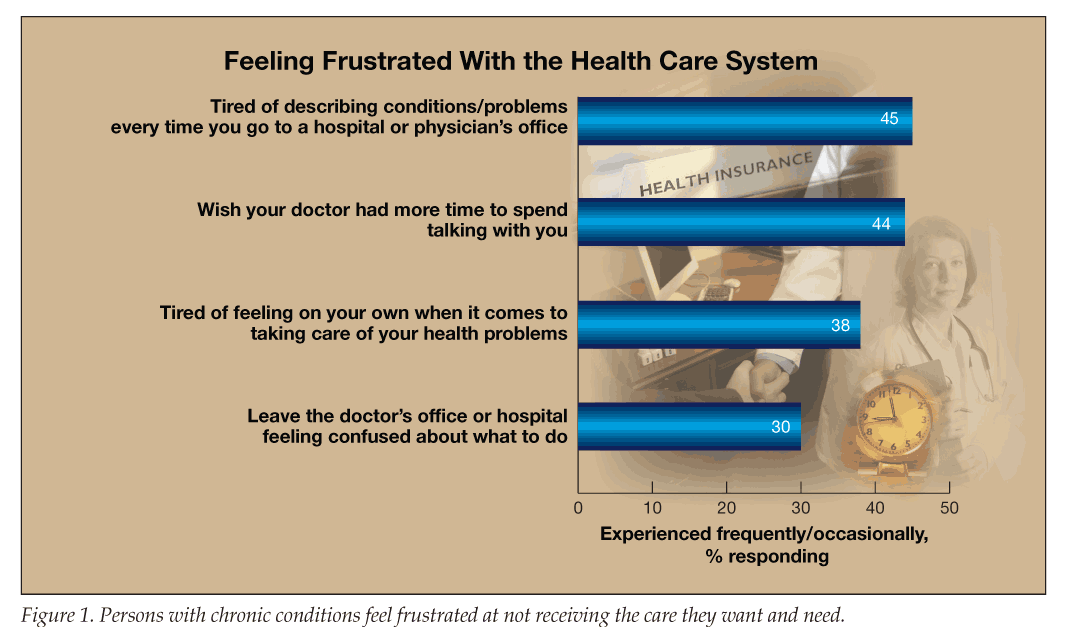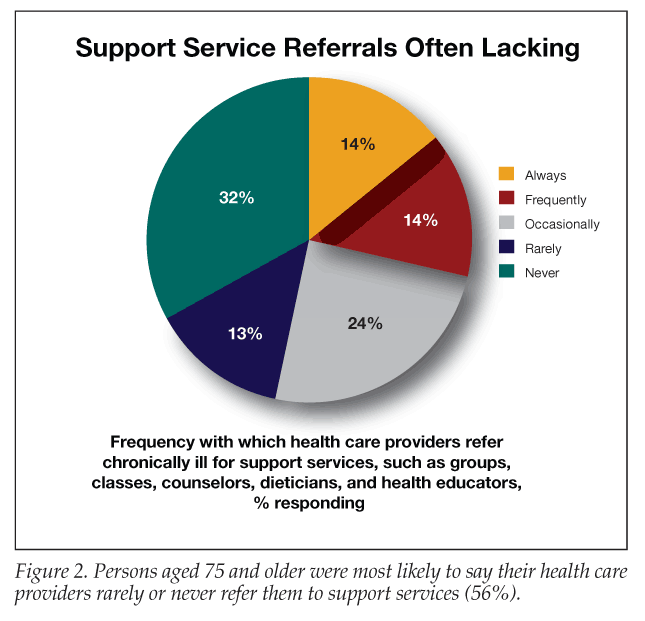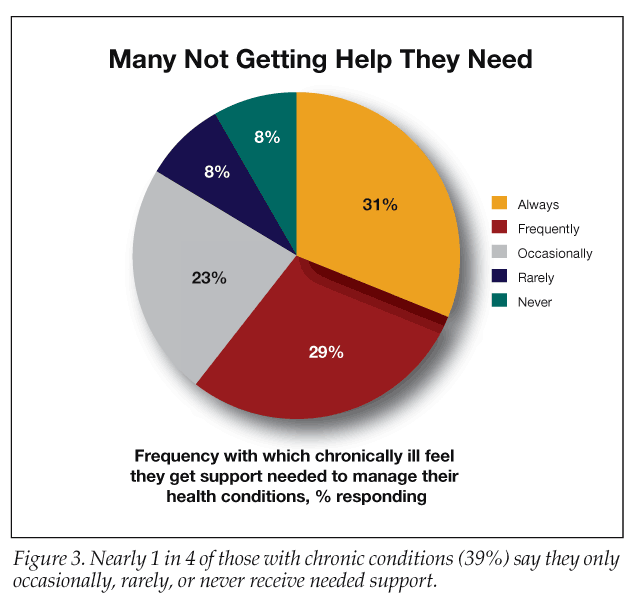- Clinical Technology
- Adult Immunization
- Hepatology
- Pediatric Immunization
- Screening
- Psychiatry
- Allergy
- Women's Health
- Cardiology
- Pediatrics
- Dermatology
- Endocrinology
- Pain Management
- Gastroenterology
- Infectious Disease
- Obesity Medicine
- Rheumatology
- Nephrology
- Neurology
- Pulmonology
Persons With Chronic Conditions Ill-Served by Health Care System
Many persons with chronic conditions are not getting the care and support they seek from the health care system, according to findings of a survey of 1109 persons aged 44 years and older with at least 1 chronic condition, stratified as baby boomers (aged 44 to 63) and seniors (aged 65 and older). Among their biggest complaints, persons with chronic health conditions say their physicians do not spend enough time with them. They also report having had to put off care because of cost.
Many persons with chronic conditions are not getting the care and support they seek from the health care system, according to findings of a survey of 1109 persons aged 44 years and older with at least 1 chronic condition, stratified as baby boomers (aged 44 to 63) and seniors (aged 65 and older). Among their biggest complaints, persons with chronic health conditions say their physicians do not spend enough time with them. They also report having had to put off care because of cost.
The telephone survey, conducted January 5 to 30, 2009, by Lake Research Partners, was commissioned by the National Council on Aging, with support from The Atlantic Philanthropies and the California HealthCare Foundation. The report is titled Re-forming Healthcare: Americans Speak Out About Chronic Conditions and the Pursuit of Healthier Lives. Chronic or serious conditions for which those surveyed had received a professional diagnosis included heart disease, cancer, stroke, diabetes, arthritis, asthma, hypertension, emphysema, chronic bronchitis, depression, and anxiety. The survey included oversamples of Latinos (n = 142) and persons aged 65 and older (n = 594).
One-quarter of respondents aged 44 and older say they have postponed medical care or filling prescriptions in the past year because they could not afford it (Cover Figure). Latinos (43%) and baby boomer women (39%) were most likely to have delayed care because of cost. Persons who have delayed health care because of cost are nearly twice as likely as others to be frequently in pain (45% vs 28% of those who did not delay care) and to be feeling stressed (40% vs 17%) as a result of their health conditions.
Nearly two-thirds (65%) of respondents rely (“a lot or some”) on health care providers for help with their health problems, followed by spouses/partners (52%), and friends and relatives (50%).

However, the health care system is not working well for many with chronic health conditions, according to the report. Forty-five percent of survey respondents with chronic conditions say they are tired of explaining their health problems every time they see a health care provider, and 44% say they frequently or occasionally wish their physician had more time to spend with them (Figure 1).
Many with chronic conditions say health care providers could do more to help them. Forty-five percent of respondents say their health care providers rarely (13%) or never (32%) refer them to support services (Figure 2).

Nearly 4 in 10 persons (39%) with chronic conditions say they only occasionally, rarely, or never get the help and support they need to manage their conditions and improve their health (Figure 3). Those least likely to receive needed support were persons without health insurance (55% responded occasionally, rarely, or never), Latinos (53%), those with annual household incomes of $20,000 or less (50%), and persons who have postponed care in the past year because of cost (49%).
For some with chronic illnesses, daily life is a struggle. Almost one-third (32%) of survey respondents are always or frequently in physical pain because of health problems; the percentage increases to 58% among those with 4 or more chronic conditions. More than a third (34%) are frequently feeling tired and lacking energy. Nearly two-thirds (65%) feel stressed at least occasionally because of their health problems. Half say their health problems make them feel depressed (50%) and angry (49%) at least occasionally.

As a result of their health problems, nearly one-third (32%) of survey respondents have had to cut back on social activities. More than 1 in 4 of those currently employed (26%) have had to miss work because of illness.
Costs, lack of confidence, and inadequate knowledge also act as barriers to successful management of their conditions.
More than 7 in 10 (71%) say learning how to exercise or eat better in realistic ways that work with their limitations would be helpful, as would receiving practical tips and advice from others who have similar health problems (68%).
Despite their own problems, nearly three-quarters (74%) of survey respondents say they are willing (24% very willing, 50% somewhat willing) to help others in their communities manage chronic health problems. ?
Data for the Cover and in the “Trend of the Month” are from Re-forming Healthcare: Americans Speak Out About Chronic Conditions and the Pursuit of Healthier Lives, commissioned by the National Council on Aging. The survey report is available at www.ncoa.org/healthierlives.
